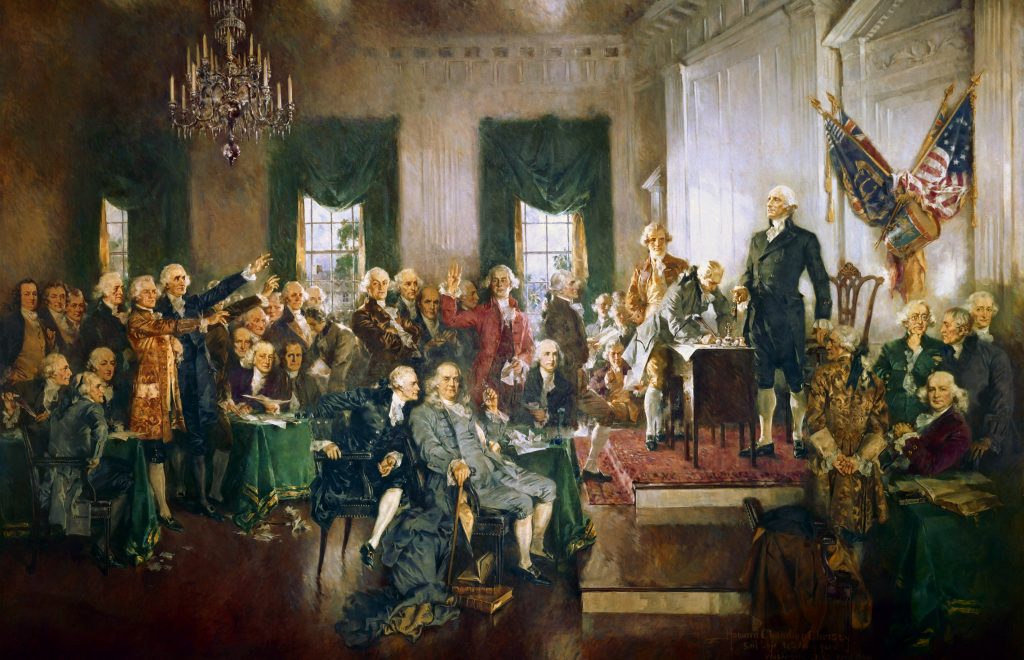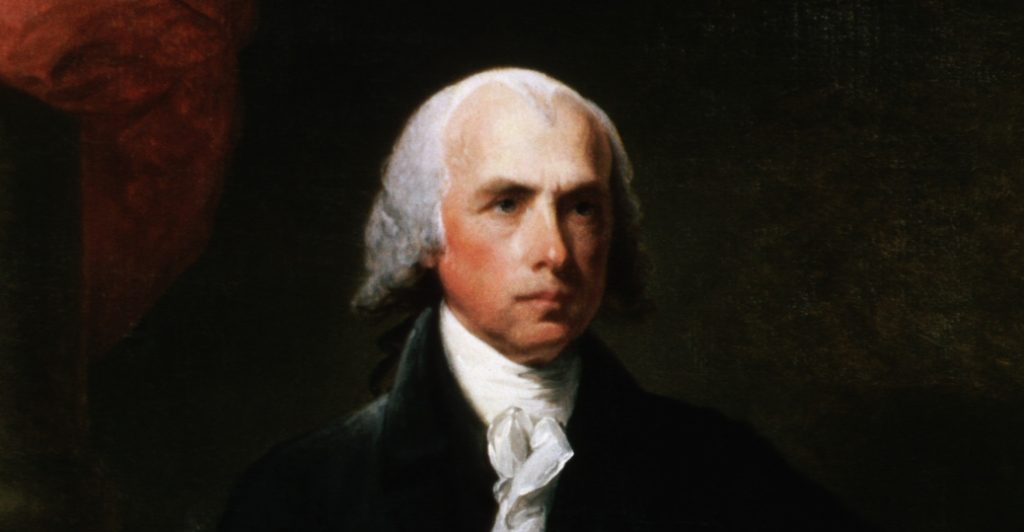There are a number of inconsistencies in the writings of James Madison. Some of those inconsistencies regard states’ rights, the importance of having a bill of rights in the U.S. constitution, and the appropriate size of government.1 One of the inconsistencies that have troubled scholars of Madison is his beliefs on the appropriate extent of popular participation in government. Scholars have addressed this issue in a couple of different ways. Citing his Party Press Essays, some argue that Madison approved of large popular participation.2 Others argue that this type of approval was only on the condition that the majority meet educational, economic, and other standards.3 While Madison’s writings suggest that he could not be anything less than a champion of democracy, his actions at the Constitutional Convention do not uphold this view. Madison sought to strip away the sovereignty of the majority (free, white men) because he distrusted them for many reasons. He also doubted their ability to direct government. Furthermore, he blamed them for the state of the Articles of Confederation and its inability to deal with its own problems efficiently. This combination led him to disapprove of democracy and to oppose the creation of a government that allowed ordinary citizens to wield a meaningful amount of power in government.4
Scholar Neal Reimer correctly argues that Madison did indeed express favor for popular participation in government in his Federalist Essays and Party Press Essays. Madison wrote that, “Public opinion… is the real sovereign in every free [government]” and that citizens should not abide by a rule they do not have any say in.5 But this was not Madison’s complete stance on democracy.
When Madison speaks of popular participation in his article “Public Opinion,” for example, he is not talking about the majority of his own time. He is talking about an enlightened, dispassionate, and interconnected majority: the appropriate majority for a smooth working, just, and free government; that is, someone who embodied the ideals of Republican virtue. Education was not wide-spread at the time, so the majority of Americans in 1787 was not as educated as the majority he supposed in Federalist No. 39. Lacking this education would cause the majority of his day to make decisions in government that were not favorable or in the best interest of the Confederation. The majority of Madison’s time was also not as interconnected as he would have preferred them to be; news and ideas traveled slowly, and the vast and scarcely populated land of North America did not bring people together. This caused a lack of cohesion in ideas, which resulted in a large amount of disagreement that thwarted government from moving forward with reasoned decisions. Also, the disparity between the majority’s and the elite’s access to resources was too great. This would lead to a passion-fueled abuse of power by the majority.
For Madison, education, interconnectedness, cohesion, and economic capacity were important qualities that a majority had to have in order to responsibly wield power in their government.6 These would safeguard against the abuse of governmental power and other vices, as well as create more cohesion among citizens to move government along.7 The majority of his time did not possess these qualities, and for this reason as well as the current state of the Confederation, he argued in favor of the Virginia Plan.

The Virginia Plan sought to bolster the power of the federal government by giving it the power to negate state laws that contradicted with federal laws. This not only limited the sovereignty of the states, but the sovereignty of the people as well. This was a favorable plan to Madison, because he observed that the Articles of Confederation did not give the federal government enough power to protect and govern the Union efficiently. This lack of federal power is what Madison attributed to the failure of the Articles of Confederation.8
The abundance of power that states held was also to blame for the failure of the Articles of Confederation. The states lacked cohesion, and the people from whom they derived their power were to blame. Taking power away from them would make the federal government more efficient, and limiting states’ rights would help accomplish that.9 This is what Madison was most concerned with. It seemed that he understood that the creation of this new constitution would be the solution to this inefficient and divided union.10 Otherwise, preserving states’ and citizens’ power or voice in government would be simply recreating another Articles of Confederation and its problems.
It is acknowledged that Madison was not only skeptical of the majority, but of government officials as well. He wrote in his Federalist No. 39 that democracy would be a safeguard against abuse by government officials.11 And what he meant by democracy in this context was popular participation by the poor white majority of men. But, in the end, Madison had more confidence in elites like himself and government officials that he disregarded this view and advocated for the Virginia Plan. Furthermore, in the same paper, he explicitly suggests that indirect participation would be just as much of a safeguard against abuse by government officials as direct participation would be, writing, “It is sufficient . . . that persons administering [the government] be appointed, either directly or indirectly, by the people.”12 Here Madison shows a willingness to decrease the voice of ordinary citizens in government and not that of government officials.
Aside from his distrust of the majority, Madison believed that the appropriate role of citizens was simply to defend the Constitution.13 Initially, Madison did not favor a Bill of Rights in the Constitution. His understanding of the importance of a Bill of Rights was not in line with the “traditional theory” that the Bill of Rights would protect the majority from the government. Madison would later push for the Bill of Rights for two reasons, both of which do not seek to bolster popular participation.
First, Madison believed that a Bill of Rights would protect the interests of people like him: the elite minority. In a popular government, he believed there was a constant threat that the majority would succumb to their vices. He believed that they would use their influence in government to strip the minority class of their property and liberty. A Bill of Rights would serve as a safeguard for the minority class more than for the majority against government.14
Second, Madison saw an opportunity in the inclusion of a Bill of Rights to further decrease the influence of the majority. If the majority were granted a set of rights to safeguard against government, this would turn into their primary concern. Then, the majority would be inclined not to direct government, but just to protect their rights. The point here is that the Bill of Rights would ultimately serve as a distraction more than a protective measure for the majority.
Madison’s involvement in the creation of the Constitution was not objective. He was subjective and inclined toward advocating for positions that protected, if not furthered, his interests and those of others like him. Madison was a privileged young man growing up; his family was affluent and owned a good deal of land. Liberty and property were some of his main concerns. In a popular government, the majority would be the elite class’ largest threat. There is little to suggest that Madison would be most concerned with the plight of the majority rather than with the interests of the elite. Current events, in addition, made him worry about his property.15
Colleen Sheehan argues that this type of interpretation of Federalist No. 10 is incorrect based on Madison’s “Notes on Government.”16 She argues that his notes suggest he is approving of this large majority’s participation in government and that critics of Madison have taken this paper out of context. But it is Sheehan’s argument that is out of context. Madison wrote these notes on government, as she mentions, in response to theoretical writers’ arguments that say a republic can only work in a small society. This argument does not address the issues of the majority that Madison addressed in his Public Opinion and Federalist no. 39. The issues of the majority that Madison addressed in his Public Opinion, and in Federalist No. 39, was that of whether or not the majority had the capacity to direct government. In these essays, Madison does not have a problem simply with the size of the group participating in government, but with the majority’s capabilities. Madison also addressed whether or not the majority possessed civic virtue.
With all of these factors considered, Madison’s approval of popular participation was indeed conditional, as Gabrielson argues. For the majority to exercise a great deal of participation, they must be enlightened, virtuous, dispassionate, cohesive, and economically up to par. But his majority then was largely uneducated, they were spread out on the vast American land, and the economic gap between the elite and the masses was great. Since the majority of his day did not possess these qualities, they were not capable of directing government. The failure of the Articles of Confederation further supported this view of the majority. For these reasons, he believed that the appropriate extent of popular participation then should be limited to protecting the Constitution instead of directing government.17 This way, the state of the Confederation could be properly addressed. The federal government could better address the problems of the Confederation with more independence from the influence of the majority. Lastly, the rights of the elite would meet a less severe threat from the passions of a majority that was easily susceptible to dissatisfaction and other vices.
- For scholarship on Madison’s inconsistencies, see Neal Riemer, “Republicanism of James Madison,” Political Science Quarterly 69, no. 1 (1954): 45-64, and Teena Gabrielson, “James Madison’s Psychology of Public Opinion,” Political Research Quarterly 62, no. 3 (2009): 431-444. ↵
- Colleen Sheehan, “Madison’s Party Press Essays,” Interpretation: A Journal of Political Philosophy 3, no. 177 (1990): 355-377. ↵
- Teena Gabrielson, “James Madison’s Psychology of Public Opinion,” Political Research Quarterly 62, no. 3 (2009): 431-444. ↵
- For example, see Jack N. Rakove, James Madison and the Creation of the American Republic (New York: HarperCollins Publishers, 1990), 53-69. At the Constitutional Convention, Madison argued in favor of the Virginia Plan that would allow the federal government to overrule any state law that contradicted with federal laws. This measure would limit the voice of citizens in their government. ↵
- James Madison, “Public Opinion,” National Gazette, December 1, 1791. For similar sentiments from Madison, see James Madison, “Federalist no. 39: Conformity of the Plan to Republican Principles,” Independent Journal, January 16, 1788. Madison wrote, “Public opinion… is the real sovereign in every free government.” ↵
- Teena Gabrielson, “James Madison’s Psychology of Public Opinion,” Political Research Quarterly 62, no. 3 (2009): 431-444. Gabrielson makes this point and lists these as the conditions under which Madison would approve of democracy. ↵
- For examples of the vices of the majority, see James Madison, “Federalist no. 10: The Utility of the Union as a Safeguard Against Domestic Faction and Insurrection,” Daily Advertiser, November 22, 1787. ↵
- Jack N. Rakove, Declaring Rights: A Brief History with Documents, (New York: St. Martin’s Press Inc., 1998), 102-103. ↵
- Jack N. Rakove, James Madison and the Creation of the American Republic (New York: HarperCollins Publishers, 1990), 53-69. ↵
- Jack N. Rakove, James Madison and the Creation of the American Republic (New York: HarperCollins Publishers, 1990), 53-69. ↵
- James Madison, “The Federalist No. 39,” Independent Journal, January 16, 1788. ↵
- James Madison, “The Federalist No. 39,” Independent Journal, January 16, 1788. ↵
- Teena Gabrielson, “James Madison’s Psychology of Public Opinion,” Political Research Quarterly 62, no. 3 (2009): 434-435. ↵
- Jack N. Rakove, Declaring Rights: A Brief History with Documents, (New York: St. Martin’s Press Inc., 1998), 100. ↵
- Edward McNall Burns, James Madison: Philosopher of the Constitution (New Brunswick: Rutgers University Press, 1938: 1-69. ↵
- Colleen A. Sheehan, “The Politics of Public Opinion: James Madison’s ‘Notes on Government’,” The William and Mary Quarterly 49, no. 4 (1992): 614-616. ↵
- Teena Gabrielson, “James Madison’s Psychology of Public Opinion,” Political Research Quarterly 62, no. 3 (2009): 434-435. ↵



49 comments
Jourdan Carrera
This article was a well written one which also had a bit of scholarly disagreement which is always nice to see in history. I personally agree with much is being said here by the author in that many of these men were not champions of democracy but rather champions of the rule of the few, not the many. The wanting to keep the uneducated white man out of government due to the lone factor that he is uneducated is a terrible one and this article does an excellent job in displaying the faults of these American revolutionary thinkers.
Phylisha Liscano
Hello Adziko, this was a very well put article. Filled with lots of facts. Taking a look at your citations, I can tell lots of research was put into this article. The first photo of one of our founding fathers was a great glimpse of James Madison looked. It was very interesting reading how Madison did not trust the majority and the work that he put into the Virginia Plan.
Santiago Sabogal
Personally, I would say that this is a very well structured article. Adziko quoted multiple times and you can see the good use of sources in his article. I found the article very educational and the author did a good job showing us the thoughts of James at that time and how he contradicted himself multiple times. At the end of the day, I would agree with the author saying that James just was trying to take advantage of his minority position and trying to benefit this specific social group.
Aidan Farrell
This was a very well done article, Adziko. I did not much at all about James Madison besides his role in the Broadway Musical Hamilton, but this article helped me open my eyes to what a big part he played in the framing of our country’s ideals. This article helped tell me what Madison believed in, which i also did not know about. The word choice is impeccable and I like how you structured the article. Well done.
Sabrina Drouin
I really enjoyed getting to know more about James Madison through this article. It is always interesting to hear about our founding fathers and how he didn’t trust the majority of people, which led to the making of the Bill of Rights. Although it is strange that he supported the Virginia Plan to have a stronger central government. Even though he didn’t trust the majority or the government officials and deeply wanted to protect his rights. Nevertheless, he fought for a Bill of Rights, maybe not for anyone’s interest except his own, but it is interesting to hear about how it came about.
Amelie Rivas-Berlanga
I thoroughly enjoyed reading this article. It is interesting reading about how the founding fathers did not trust the majority. Reading more into who James Madison was. Madison wanted the people to have a voice when it came to electing higher-ups. He wanted to make sure that the elites were educated. It is interesting to read the difficult decision about the democracy of our country.
Samuel Vega
This article gives me a different view of Madison. He created the Virginia Plan which supported the creation of the Executive, Judicial, and Legislative Branches of our government; with the Legislative Branch being dividing into two houses. However, Madison was conflicted on the running of the government because he was concerned that the majority, who were uneducated and of lower economic status, would have too much power to influence the government. I can see how the title of the author’s article has a question mark in it.
Mariah Podwika
This was a really good article! I really enjoyed how deep it went in exploring and explaining how back and forth Madison was in what he did and didn’t support. I find it a little comical that Madison had a bad tendency to overestimate the education of most people. I think it says a lot that he was split between the democratic choice and ensuring that the uneducated wouldn’t be in charge of the country.
Seth Roen
People tend to forget or instead choose not to mention that most of the Founding Fathers did not trust the people in it entirely. In all fairness, most republics at the time held similar practices of landowners and or wealthy controlled the government. It is interesting how Madison’s distrust towards the ordinary person was somewhat proven in the brief confederation the young nation was before becoming a federal union.
Azariel Del Carmen
I am a bit surprised but at the same time, not so by how Madison, one of the founding fathers of this country told and expressed the words he used for democracy in government. Madison I am surprised by how back and forth he was with what he stated in the Federalist Papers to what he actually was doing trying to get the constitution passed with the Virginia Plan being to go-to direction than the New Jersey Plan. However I can’t blame him for not trusting the people who at the time just lived to make new lives and grow the country and before colony they were in for the better of it and their future. No one except the elite had access to education so I can see how Madison would not trust them and other factors but at the same time it is what to be expected for it’s time. I would say this article has given me a mixed view now of Madison in history and had me think as to how everyone acted to the people that live majorily in their country and how more did they think of them.